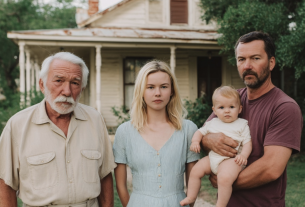Lena stood by the window of her empty apartment, looking down at the courtyard where her children used to play. Misha was twenty now, working in St. Petersburg, and Katya was eighteen—a university student. The apartment felt huge and inhospitable without their laughter, without the constant rushing about, without the mountain of textbooks on the table.
Many years ago, when Misha was born, she left her job in advertising. “Why do you need that career,” Andrey had said then, “I’ll earn the money, and you take care of the home and the kids.” And she did. She cooked, washed, cleaned, ferried them to clubs and sports, nursed them when they were sick, helped with homework. When Katya was born, life turned into a nonstop marathon: up at six, breakfast for everyone, seeing her husband off to work, taking the kids to daycare and school, then shopping, cooking, cleaning, picking up the kids, clubs, homework, dinner, laundry, ironing… And so every day.
Andrey would come home tired, eat in silence, and turn on the TV. On weekends he met friends, played football, or went fishing. “You relax at home all week,” he’d say when she asked him to stay home and help with the kids.
And his mother, Valentina Petrovna, regularly reminded her: “Andryusha gets tired at work; he needs peace at home. And you? You sit at home like a lady of leisure. In my day, women worked and kept house.” Lena kept quiet, clenching her teeth. Explaining was pointless—her mother-in-law saw only what she wanted to see.
The years flew by unnoticed. The children grew up and became more independent. Lena began thinking about going back to work, about taking care of herself. She joined a gym, started taking better care of herself, updated her wardrobe. For the first time in many years she looked in the mirror and thought, “You know, I still look pretty good.”
But Andrey didn’t notice. Or didn’t want to. He stayed late at work more and more often, became cold and distracted. And then he announced that he’d fallen in love with his new secretary, Alina. Twenty-five, bright, ambitious.
“Forgive me, Len,” he said while packing his things, “but I can’t anymore. I need new sensations, new emotions. Alina understands me—she’s so… alive.”
Lena said nothing, watching her world collapse. Eighteen years of marriage, two children, shared plans and dreams—all of it turned out to matter less than a young body and adoring eyes.
Naturally, Valentina Petrovna sided with her son:
“What did you expect, Lenochka? You’ve completely let yourself go. Sitting at home in a robe, not bothering with your hair. Men love with their eyes. And you… Andryusha needs a woman by his side, not an overworked housewife.”
Lena didn’t bother reminding her who had insisted she stay home and devote herself to the family. She simply left and stopped answering her mother-in-law’s calls.
The divorce was quiet. Andrey left her the apartment—apparently his conscience still functioned. He provided money for the children regularly but avoided any contact with his ex-wife. Fortunately, the kids were already grown and decided for themselves how and with whom to communicate.
Lena found a job at a small advertising agency. Life began to settle, slowly but surely. She learned to live alone, to get to know herself again. But the pain of betrayal didn’t go away. What hurt most was thinking that twenty years of her life turned out to be needed by no one.
And then one morning a notary from Moscow called:
“Elena Mikhailovna Voronova? Please accept my condolences. Your aunt, Anna Mikhailovna Drozdova, has passed away. You are the sole heir under her will.”
Aunt Anya. Lena barely remembered this woman—her father’s sister, who had moved to Moscow many years ago and occasionally sent New Year postcards. They had seen each other only a few times in childhood.
“What’s in the inheritance?” Lena asked.
“A three-room apartment in central Moscow, a collection of antiques, and two million rubles in a bank account,” the notary replied.
Lena nearly dropped the phone. Two million rubles… For someone earning forty thousand a month, it was a fantastic sum.
That very day she told her friend Marina. Marina was genuinely delighted:
“Len, can you imagine? It’s fate! A new life in the capital, new opportunities! I’m so happy for you!”
Lena flew to Moscow to process the inheritance. The apartment turned out to be a real treasure—an old building in Khamovniki, high ceilings, parquet floors, a tiled stove. The antiques—paintings, porcelain, silver—were all worth a good deal of money. It turned out Aunt Anya knew art and had spent her life collecting.
While Lena was in Moscow, Marina apparently couldn’t help herself and told some mutual acquaintances about her friend’s inheritance. And they told others. In a small town news spreads fast.
When Lena returned home with the inheritance papers, a surprise awaited her. The very next day a familiar SUV pulled up to her building—Andrey’s car.
He went up to their former apartment and rang the bell. He looked worse for wear—gaunt, with bags under his eyes.
“Len, I need to talk to you,” he said.
“What is there to talk about, Andrey? We said everything six months ago.”
“I made a mistake. I understand now. With Alina… it was foolishness. I need you, our family.”
Lena opened the door but didn’t invite him in:
“Family? The same family you abandoned for a young mistress?”
“Forgive me. I was a fool, an idiot. But we have so much together! The kids, the years… I love you.”
“Love?” Lena smirked. “You have a strange kind of love. It disappears whenever something newer and shinier comes along.”
“Len, give me a chance. I’ve changed. Alina… she wasn’t who I thought she was. Mercenary, selfish. And you… you’re the real thing.”
“I wonder,” Lena thought, “when did he realize that? Before or after he found out about the inheritance?”
The next day, Valentina Petrovna turned up. She came with a cake and a bouquet of flowers.
“Lenochka, dear, how are you? I’ve missed you so much!”
“Valentina Petrovna, we haven’t spoken in six months. What’s with the sudden concern?”
“Oh, Lena, don’t be like that! I understand, you’re hurt. But family is sacred! Andryusha told me everything—how he repents. He’s my silly boy, impulsive. Men do foolish things sometimes, and then they come to their senses.”
“And what are you proposing?”
“Forgive him, Lenochka. You were together so long, you have children… And that secretary—she’s just passing through. Andryusha understands now that true happiness is home, family, a faithful wife.”
Lena listened in amazement. Six months ago this same woman told her that she herself was to blame for her husband’s departure. And now she was begging her to forgive her “silly son.”
“Valentina Petrovna, do you remember what you told me during the divorce? That I’d let myself go, that men love with their eyes?”
Her mother-in-law grew flustered:
“Oh, come now, Len, I only said that out of distress. You know how I love Andryusha; I was just protecting him. In truth, I’ve always thought you were the ideal wife.”
Lena barely stopped herself from laughing. An ideal wife—when she’s needed. And when a younger replacement appeared, she instantly became a “slovenly housewife.”
For a week Andrey called every day. He begged for a meeting, sent flowers, drove over and stood under her windows. Valentina Petrovna didn’t let up either—she phoned, cried into the receiver, asked her to “keep the family together.”
Lena was torn. On the one hand, it was pleasant to see them humbling themselves, asking for forgiveness. On the other, she wanted revenge. But how?
She imagined different scenarios. She could agree to meet Andrey, give him hope, and then humiliate him publicly—invite him to a restaurant and announce in front of everyone what a scoundrel he was. Or agree to reconcile, live with him for a month or two, and then kick him out again—let him feel what it’s like.
But all those options seemed petty and unworthy. And she had no time for games—she had already filed papers with a local real-estate agency to sell her apartment and was planning her move.
The decision came by itself after a conversation with her son. Misha called from St. Petersburg:
“Mom, Dad says he wants to come back to the family. Says he made a mistake.”
“And what do you think about that?”
“What can I think? You’re adults; sort it out yourselves. But my personal opinion—he made his choice six months ago. It’s too late to flail about.”
“Mish, would you mind if I moved to Moscow?”
“Mom, I’m all for it! You lived for us, for the family, for so many years. Now live for yourself. You’ve got a chance to start fresh—take it.”
After that conversation Lena understood: the greatest revenge isn’t humiliating Andrey or his mother. The greatest revenge is her happiness. Her new life. Her freedom.
When Andrey called again to ask for a meeting, she agreed. They met at a café near her home.
“Thanks for coming,” he said. “I was hoping…”
“Andrey, I want to tell you something. You’re asking forgiveness, you want to come back. But you’ve forgotten one important detail.”
“What detail?”
“I don’t love you anymore.”
He turned pale.
“That can’t be. We have so much in common…”
“Yes, we have children and shared memories. But love… it left the moment you told me you were in love with someone else. When you explained that I’d become uninteresting, that you needed new thrills.”
“But I’ve changed! I understand what I’ve done!”
“You understood it after you found out about my inheritance. Curious, isn’t it?”
Andrey flushed.
“What does the inheritance have to do with it? I didn’t know anything…”
“You didn’t? Then where did this sudden enlightenment come from? Why did you remember your love for me now, of all times?”
He said nothing, staring at the table.
“You know, Andrey, I’m grateful to you. You set me free. For eighteen years I lived by your interests, catered to your wishes, raised your children. And now I have a chance to live for myself.”
“Len…”
“I’m moving to Moscow. I’m starting a new life. And you know what’s most interesting? I’m happy. For the first time in many years, truly happy.”
Andrey sat in silence, then quietly asked:
“What am I supposed to do now?”
“I don’t know. It’s your life, your choice. You wanted freedom—you got it. Enjoy.”
Lena stood and walked to the door. She turned back:
“And tell your mother not to call me anymore. I bear no grudge, but I’m not going back to the past.”
At home she turned off her phone and started packing. The apartment had already been sold; the buyers promised payment in a week. All that remained was to box up the essentials and send them to Moscow.
That evening Marina called:
“Len, where are you? The whole town is gossiping that you told Andrey to get lost and are moving to the capital.”
“What’s there to gossip about? They’ve got it right.”
“But he’s repentant! Maybe you should have given him a chance?”
“Marina, would you give a chance to a husband who left you for a young mistress? And would you give it precisely when you’d just come into money?”
Marina fell silent.
“You see? I already gave him twenty years. That’s enough.”
A week later Lena stood in Aunt Anya’s Moscow apartment, looking out the window at the ancient streets of Khamovniki. It was quiet here, peaceful, historic. A place to start over.
She took out her phone and wrote to her children: “Come visit. We have a home in Moscow now.”
Then she sat down at Aunt Anya’s antique writing desk and began drafting a plan for her new life. At forty-two, she was finally free. Free to be herself, to do what she wanted, to make her own plans.
Revenge? Yes, she had taken revenge. In the best possible way—with her happiness. Let Andrey and his mother know this: the woman they considered a “slovenly housewife” managed to build a new life. Without them. And in that life, she is happy.
And that, perhaps, is the sweetest revenge of all.



